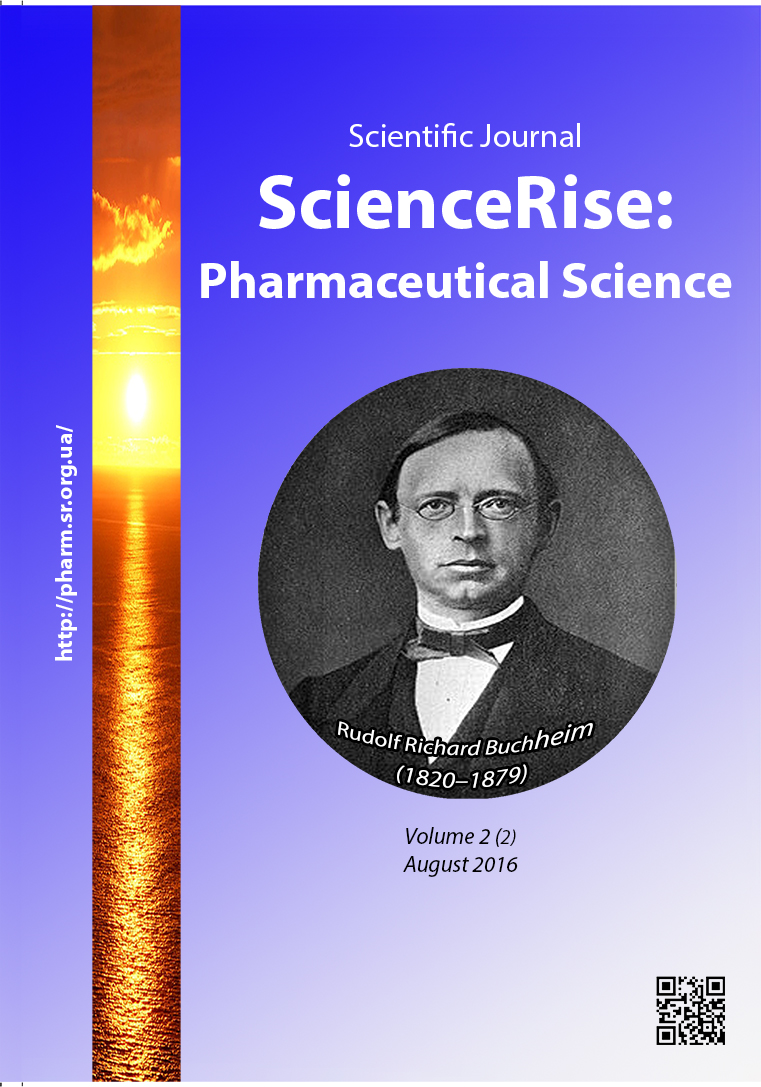Study of the antimicrobial preservatives effectiveness test in development of the combined syrup composition
DOI:
https://doi.org/10.15587/2519-4852.2016.75985Keywords:
combined syrup, excipients, preservatives, antimicrobial activity, Potassium sorbate, technologyAbstract
Aim. The aim of our research was to substantiate and to study the antimicrobial preservatives effectiveness in development of the combined syrup basis composition based on the natural extracts and applied for the hepatobiliary system and gallbladder disorders treatment.
Methods. Biological pharmacopoeial method (antimicrobial preservatives effectiveness) was used.
Results. According to the results of research of the antimicrobial preservatives series, following data were obtained. № 1 and № 2 syrup series (containing Nipagin : Nipasol (3 : 1) 0.1 % and 0.2 %), № 3 and № 4 series (containing Potassium sorbate 0.1% and 0.2%), №5 and №6 series (containing Sodium benzoate 0.1 % and 0.2 %) met the criteria of antimicrobial preservatives effectiveness evaluation recommended by the SPhU for oral drugs.
It has been found, that all experimental samples of the developed syrups after adding the selected preservatives are promising for the further research in area of oral remedies creation. Nevertheless, the antimicrobial effectiveness of Potassium sorbate is slightly higher (lg of reducing the number for Candida albicans АТСС 885-653 viable cells is 3.55; for Aspergillus brasiliensis АТСС 16404 is 2,3), and antimicrobial activity spectrum is wider, which will promote the quality of the developed syrup, as well as during its storage period. Therefore, Potassium sorbate will be used as a preservative in the following research.
Results. The advisability of using of Potassium sorbate as a preservative in development of the combined syrup basis with complex pharmacological activity was theoretically substantiated and experimentally provedReferences
- Drogovoz, S. M., Shhekina, E. G., Ushakova, A. (2008). Sovremennye podhody k terapii zabolevanij gepatobiliarnoj sistemy. Provizor, 8.
- Juskeeva, V. S. (2013). Chastota vstrechaemosti porazhenija gepatobiliarnoj sistemy pri mochekamennoj bolezni. Bjulleten' medicinskih internet-konferencij, 3 (3), 805.
- Gudzenko, O. P., Nemjatyh, O. D., Kuldyrkajeva, K. V. (2013). Doslidzhennja aktyvnosti antymikrobnyh konservantiv v dytjachomu syropi na osnovi soku smorodyny chornoi' ta etamzylatu. Ukrai'ns'kyj zhurnal klinichnoi' ta laboratornoi' medycyny, 8 (1), 244–247.
- Brooks, A., Asamudo, N., Takon, I. (2012). Bacteriological stability of high sugar rediatric syrups probability of survival of contaminating bacteria. Journal of Pharmaceutical and Biomedical Sciences, 22 (13), 1–4.
- Tukur, M., Muazu, J., Mohammed, G. (2012). Microbial analysis of brands of multivitamin syrups marketed in Maiduguri, Northeast Nigeria. Advances in Applied Science Research, 3 (5), 3124–3128.
- Mirsonbol, S. Z., Issazadeh, K., Pahlaviani, M., Momeni, N. (2014). Antimicrobial efficacy of the methylparaben and benzoate sodium against selected standard microorganisms, clinical and environmental isolates in vitro. Indian Jornal of Fundamental and Applied Life Sciences, 4 (S4), 363–367.
- Stanojevic, D. C. (2009). Antimicrobial effects of Sodium benzoate, Soium nitrate and Potassium sorbate and Their synergistic action in vitro. Bulgarian Journal of Agricultural Science, 15 (4), 307–311.
- Derzhavna Farmakopeja Ukrai'ny. Annex 4 (2011). Kharkiv: RIREG, 536.
- Derzhavna Farmakopeja Ukrai'ny. Vol. 1 (2015). Kharkiv: Derzhavne pidpryjemstvo «Ukrai'ns'kyj naukovyj farmakopejnyj centr jakosti likars'kyh zasobiv», 1128.
- Dafale, N. A., Semwal, U. P., Agarwal, P. K., Sharma, P. (2014). Evaluation of preservative effectiveness in antacid, cough syrup and ophthalmic solution by microbial challenge test. International Journal of Pharmacognosy, 1 (3), 193–199.
Downloads
Published
How to Cite
Issue
Section
License
Copyright (c) 2016 Олександр Олександрович Шмалько, Лілія Іванівна Вишневська, Оксана Петрівна Стрілець, Володимир Костянтинович Яковенко

This work is licensed under a Creative Commons Attribution 4.0 International License.
Our journal abides by the Creative Commons CC BY copyright rights and permissions for open access journals.








